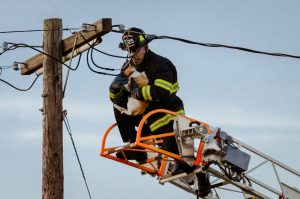None of us were truly prepared for the impact of Hurricane Helene; the heavy rain, wind and storm surge. While we try to prepare, seeing is believing. Whether you were driving down the west coast beaches in Florida, looking at the flooding around Tampa Bay or witness to the catastrophic devastation in the mountains of the Carolinas and East Tennessee; the suffering is real.
While some businesses close, there are many professions that are required to work during natural disasters. These include law enforcement, fire fighters, paramedics, hospital staff, nursing facilities, not to forget the linemen and women that work to ensure the power restored. These men and women are now living at the duty station, working 12 hour shifts, while hoping their families are safe. So while many of us evacuate or shelter in place, these frontline workers showed up day after day, putting their life on the line to restore safety for the rest of us.
While some may suggest our first responders and frontline workers appear stoic, all of this stress and fear took its toll, even on the bravest among us. As a result, many frontline workers have found themselves burnt out and experiencing symptoms of anxiety or possibly depression.
Symptoms of Depression and Anxiety
It’s common for everyone to feel stressed or sad from time to time. But when certain symptoms linger, you may be dealing with depression or anxiety. If you’ve never dealt with either before, you may not know the symptoms.
Symptoms of depression include:
- A persistent feeling of sadness
- A lack of energy
- Feelings of hopelessness
- Sleep disruption (either sleeping too much or too little)
- Appetite disruption (eating too much or too little)
- Difficulty focusing
- A loss of enjoyment of previous hobbies or activities
- Thoughts of death or suicide
Symptoms of anxiety can include:
- Excessive worry
- Agitation
- Restlessness
- Fatigue
- Difficulty concentrating
- Tense muscles
- Panic attacks
- Trouble falling or staying asleep
- Irrational fears
Seek Support
For many first responders and front line workers, all of their time and focus is on how they can help others. The idea of self-care and asking others for help is not something on their radar.
If you are experiencing symptoms of anxiety, depression or perhaps secondary trauma from everything that you have seen- it’s important that you let someone else help you. A therapist can offer strategies that will help you cope with your symptoms and deal with the underlying emotions.
If you or someone you know would benefit from counseling, please get in touch with me. I offer both in-person appointments as well as telehealth video appointments (*for those who are located in Florida/ where I am licensed).



Leave a Reply